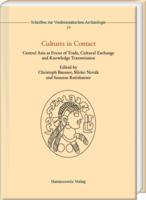|
|
more titles of the subject:
Central Asia is a vast region separating and at the same time connecting the civilizations of the Near East, East Asia and the Indian subcontinent with each other and with the neighboring nomadic cultures.
This richly illustrated book reflects the contributions of a conference that took place in Bern in 2020 and includes 32 contributions from 56 authors from 18 countries. The conference evaluated the supra-, inter-, and intraregional modes of cultural exchange and knowledge transfer like trade, migration, missionary activities or military encounters. This exchange occurred within Central Asia, from the outside into Central Asia or conversely out of Central Asia to neighboring cultures. The timeframe considered was from the Early Bronze Age to the period of Amir Timur (end of the 14th century CE) and the geographic scope stretched from the eastern Caucasus in the west till Xinjiang in the east and from southern Siberia in the north till Baluchistan in the south. All papers presented were based upon new archaeological investigations, surveys and discoveries. Most of the contributions suggest that in Central Asia, based on its specific geopolitical location, typical “contact cultures” blossomed which were influenced to varying degrees by the neighboring cultures and thus produced many facets of cultural hybridisation. The conclusions of many of the excavations presented here will be published in English for the first time. Each article is accompanied by an extensive bibliography and a Russian abstract. |






